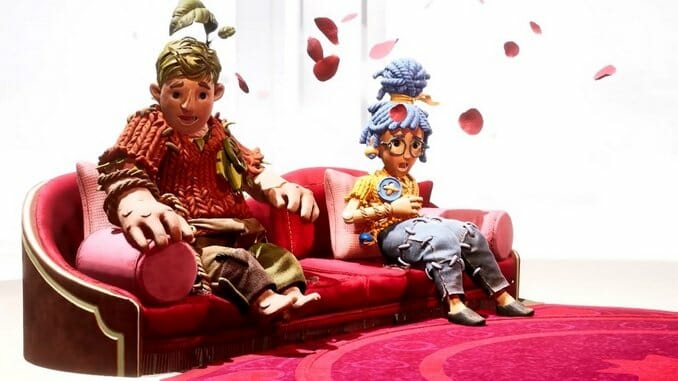When I decided to watch through Breaking Bad for the first time last year, it wasn’t the violence, drug abuse or anxiety-inducing scenes that forced me to take a break from it. After having been the child of three divorces—the first being in infancy, the latest being last year—I couldn’t handle watching another marriage deteriorate, especially in the dramatic way the show is known for.
It surprised me, then, to find that It Takes Two, the latest co-op game from film and game director Josef Fares (Brothers: A Tale of Two Sons, A Way Out), which centers on the divorce of the couple May (Annabelle Dowler) and Cody (Joseph Balderrama), was not only bearable but delightful most of the way through.
This is mostly because, throughout the majority of the game, the story about the couple’s divorce serves as a backdrop to the wacky shenanigans in the forefront. After a short introductory cutscene in which the two parents inform their young daughter Rose (Clare Corbett) that they’re divorcing, the two get transformed into dolls by the magical talking “book of love,” Dr. Hakim (Balderrama), who takes them through an unconventional and involuntary couple’s therapy session that involves a war between wasps and squirrels, the assassination of a toy elephant, putting on a concert for glowsticks, and various other adventures.
Despite the adorable creatures and creative concepts, both in terms of locations and varied gameplay mechanics, and despite delighting me for most of its time, It Takes Two’s overall story and message ultimately left a sour taste in my mouth: one that gets worse the more I think about its implications.
From the very start, it’s clear that Cody and May aren’t interested in this ride Dr. Hakim has created for them. Neither parent wants to work together, and throughout the majority of the game, they only do so in order to find a way back into their original bodies. As the game progresses, the two gradually grow closer together, showing more affection and care for one another until they finally kiss at its conclusion.
I’m not expecting a game in which a bumblebee controls a giant robot wasp queen to be realistic, but I had hoped that it would have a more genuine perspective on marriage and divorce than it ultimately did. I’ve seen firsthand that there can still be affection and love in between the fighting in relationships, but if the fighting, neglect, and other issues still cause unnecessary pain for anyone in that relationship, or especially the couple’s children, biting the bullet on divorce will often cause less long-term pain than the alternative of staying in an unhealthy family environment.
On the other hand, it’s not as if the concepts introduced by Dr. Hakim aren’t worthwhile. Making time for each other, rekindling attraction and encouraging passions are all healthy and important things for people in any type of relationship to maintain. It’s not unrealistic to think that a failing relationship could benefit or even recover if both people in that relationship make genuine efforts to fix whatever problems are causing it to fail. They’re pretty surface-level observations, but valid ones nonetheless.
Still, the impact of divorce is magnified when the health of a child is on the line. I worry that It Takes Two disregards the toll a shaky relationship can have on a child. If my parents from the second marriage had divorced earlier, I and my siblings wouldn’t have had to live in a house with constant screaming, accusations and abuse. If they had stopped to think about what that kind of environment was doing for their kids instead of holding on to whatever scraps of a relationship they thought they could salvage, we all might have been a little less fucked up.
At the end of the day, It Takes Two seldom attempts to look at things from Rose’s perspective. Up until the final scene, she mostly exists as a problem for May and Cody to contend with. In one oddly disturbing sequence, they rip up her favorite toy in an attempt to make her cry, believing that her tears will be able to transform them back into humans. It’s a strangely fitting metaphor for how these types of undead relationships can cause harm for the couple’s children, all while believing they’re making some sort of “progress.” Or maybe that’s a bit too much of a stretch.
Once the couple finally returns to their real bodies, they find a letter from Rose saying that she believes she’s the reason for their divorce, and that she’s run away so that they can “become friends again.” May and Cody find her at a bus stop and assure her that this isn’t true and that they’ll both love her no matter what, and they all go home, leaving the question of whether they’ll still go through with their divorce a bit open-ended.
It’s not the worst possible way to end things, but it still comes across as anticlimactic and wishy-washy. At the very least, I’m relieved the game sets the positive example of the “we both love you” phrase, which, although a bit cliché, is genuinely helpful to hear and something I wish I would have heard more often than the not-so-subtle jabs at the other parent I’d become more acquainted to.
But with so many pieces of media casting divorce as something indicating a failure or the worst possible outcome, I would have loved to see a story where, for once, the couple splits up and it’s not the end of the world. Ending a relationship usually hurts, for both the couple and any children. But living in an unloving home hurts far, far more.
Joseph Stanichar is a freelance writer who specializes in videogames and pop culture. He’s written for publications such as Game Informer, Twinfinite and The Post. He’s on Twitter @JosephStanichar.
